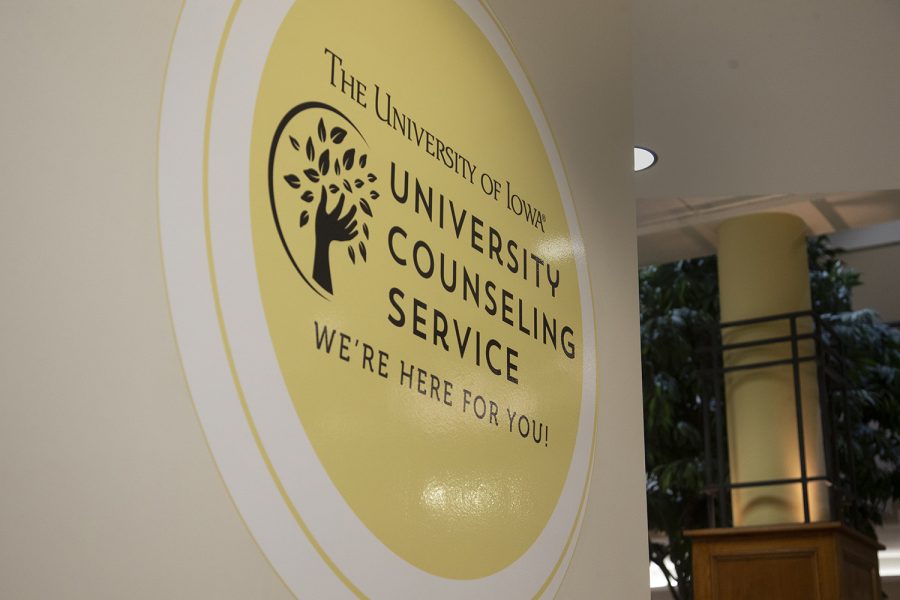UI Counseling Service Student Wellness promotes light therapy to help students with seasonal affective disorder
Second semester proves to be harder for students. Many students do not have enough time to relax and recharge during winter break and seasonal affective disorder puts limits on students’ motivation and energy.
The University Counseling Services office is seen in the Old Capital Mall on Monday, Feb. 17, 2020.
February 21, 2022
Content warning: this article mentions suicide and depression.
As the spring semester rolls around, the days get shorter, the air gets colder, and the sun doesn’t shine quite as bright.
The stress from school added onto the cold and dreary weather can lead to seasonal affective disorder or seasonal depression, University of Iowa Counseling Service staff therapist Kyle Votroubek said.
It is possible to have seasonal affective disorder in other seasons, but University Counseling Service and Student Wellness see that seasonal depression is most prominent in the winter months, Votroubek said.
The spring 2021 National College Health Assessment at the UI reported 50.1 percent of undergraduates reported receiving psychological or mental health services in their lifetime.
The most reported mental health disorders reported among UI students in the survey are anxiety, depression, and ADHD.
UI junior Kennedie King said she noticed her struggles with mental health in eighth grade.
She said she struggled with various mental health disorders through high school such as depression, anxiety, and sleep disorders. It wasn’t until college that her anxiety began to worsen.
“My first panic attack was in the winter, and I had another major panic attack this past month,” King said.
Returning from winter break, Votroubek said, is not as long as summer break and students aren’t able to recharge as much for the second semester. Most students will begin the second semester already burned out, he said.
“The world gets much smaller in winter, people tend to shut in more often and things become less accessible,” he said.
He said as opposed to returning from summer break for the fall semester, fall semester is better for most students because they come back from summer at the end of August refreshed, and fully charged.
Votroubek said a lack of social plans can also contribute to seasonal affective disorder.
“Social plans taper off in the winter when the temperature drops off, people’s social life also drops off,” Votroubek said.
According to the American College Health Association, in the fall of 2018, 63 percent of college students in the U.S. felt overwhelming anxiety at some point during that year. Of those, 23 percent were treated by a mental health professional.
He said that people need to be intentional in purposefully scheduling social activities to have something to look forward to as well as helping to increase social interactions.
Patrick Rossmann, UI Student Wellness behavioral health consultant, said light therapy boxes are available for checkout by students at the Campus Recreation and Wellness Center to help treat seasonal affective disorder.
Rossmann said light therapy was established at the university in 2018 with funding from the UI Undergraduate Student Government.
Light boxes emit a bright light that mimics natural light and sends signals to the brain. It affects the brain’s chemistry and boosts mood and energy, Rossmann said.
“Light boxes work with symptoms and combats moodiness, lack of motivation, and energy,” he said.
Lisa James, UI Student Health assistant director of quality improvement and strategic communications, wrote in an email to The Daily Iowan the symptoms that come along with seasonal affective disorder include:
- Feeling down or low energy
- Losing interest in activities you usually enjoy
- Sleeping too much
- Weight fluctuations
- Difficulty concentrating
- Feeling hopeless, suicidal thoughts
Votroubek said feeling down doesn’t have to mean sadness, it could also be feeling “blah.”
“Seasonal depression doesn’t have to be feeling emotionally sad,” he said.
Rossmann said students can check out a light box at any time.
“I recommend everyone to try it out, if they feel more affected when seasons change,” he said. “The light boxes could be meant to be used consistently, incorporating it into your daily routine.”
King said it is important to have things you can fall back on when you are struggling alone.
“It is really important to understand how to cope with it,” she said. “When it was new to me everyone would tell me to calm down and get my mind off of it but there are grounding techniques that are out there to truly get my mind off of it.”



